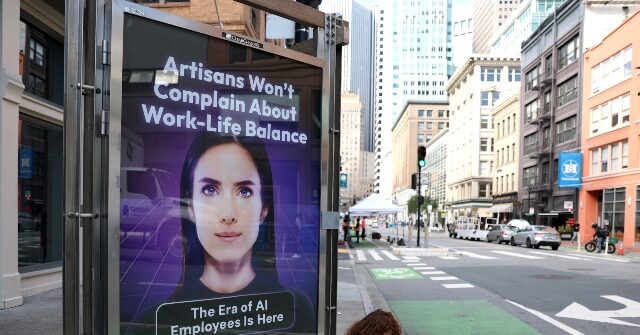In a city increasingly defined by technological layoffs and the pervasive influence of artificial intelligence, the San Francisco-based startup Artisan has launched a billboard campaign that has incited significant outrage and discussions regarding the future of work. With the tech industry facing increasing scrutiny over job displacement, Artisan’s advertisements have emerged as a focal point for debates surrounding the role of AI in labor markets. The billboard campaign, which showcases catchy phrases disparaging human employees while promoting Artisan’s AI-powered “sales agent,” has not only raised eyebrows but also ignited conversations about corporate responsibility in an era marked by rapid automation.
Artisan, relatively new to the tech scene with only 30 employees since its inception less than two years ago, is determined to make a bold statement. Their billboards feature a striking figure with dark hair and purple eyes, accompanied by provocative slogans such as “Stop hiring humans,” “Artisans won’t complain about work-life balance,” and “The era of AI employees is here.” Such assertions have understandably struck a chord with the public, leading to sharp backlash online and in community discussions. Critics have labeled the campaign a “dystopian nightmare,” with suggestions ranging from boycotting the billboards to outright destroying them, highlighting the discomfort many feel over automation’s encroachment on the workforce.
Despite the uproar, Artisan’s CEO, Jaspar Carmichael-Jack, remains unwavering in defense of the campaign. In communications with SFGate, he admitted that the billboards evoke a “dystopian” sentiment but insists that this tone accurately mirrors the transformative nature of work in the current AI landscape. According to Carmichael-Jack, the campaign has achieved its goal of elevating Artisan’s brand awareness dramatically and has resulted in a notable increase in sales inquiries. His conviction illustrates a larger narrative that many tech entrepreneurs are navigating: balancing innovation with the ethical implications of their products.
Artisan’s flagship offering, an AI sales agent, is emblematic of the kind of workforce disruption that concerns critics. The company touts its product as capable of conducting customer outreach with “no human input,” and at a cost significantly lower than traditional hiring methods—96% less, to be exact. These claims evoke serious ethical questions, particularly regarding the use of gendered pronouns and the anthropomorphization of AI. The decision to bestow the AI with a human name and face, “Ava,” complicates the conversation around AI’s role in the workplace, as it juxtaposes the allure of advanced technology against the backdrop of human labor erosion.
Amid this controversy, Artisan’s campaign also highlights the juxtaposition between the current economic climate in San Francisco and the ongoing efforts by human workers, particularly in the service sector. The stark messaging of the billboards clashes sharply with the context of hotel workers striking for better wages and job security, thereby showcasing a palpable tension between advancing automation and labor rights. This discord illustrates how technological innovations often exacerbate existing inequalities rather than alleviate them, a realization that critics have been quick to spotlight.
Looking forward, Artisan’s ambitions are not confined to the sales sector alone. The company has indicated plans to expand its AI offerings to encompass various industries, including marketing, recruitment, design, and finance. A promotional video for “Ava” boldly claims its introduction heralds a new industrial revolution, encapsulating the startup’s aspirations. However, as Artisan ventures into broader applications of AI, the public discourse surrounding job displacement and ethical treatment of workers continues to evolve. As the debate over the future of work intensifies, companies like Artisan will undoubtedly remain in the spotlight, confronting the complex interplay between innovation, ethics, and the job market.

